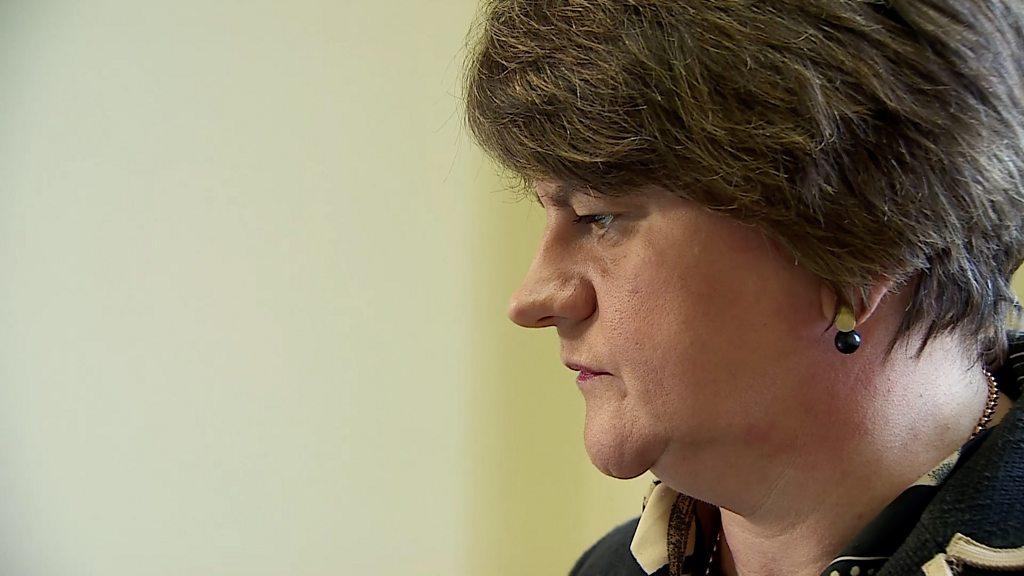Arlene Foster announces resignation as DUP leader and NI first minister
- Published
"It has been the privilege of my life to serve the people of Northern Ireland"
Arlene Foster has announced her resignation as leader of the Democratic Unionist Party and as NI first minister after an internal revolt.
Mrs Foster, 50, said she would step down as DUP leader on 28 May and as first minister at the end of June.
More than 20 DUP NI Assembly members and four MPs signed a letter voicing no-confidence in the leadership.
Mrs Foster said it had been the privilege of her life to serve the people of Northern Ireland.
She became leader of the party in December 2015 and, the following month as leader of Stormont's largest party, she was appointed first minister of Northern Ireland.
She was the first woman and the youngest person to hold both jobs.
Read Mrs Foster's full statement here, external.
Mrs Foster said it had been the privilege of her life to "serve the people of Northern Ireland as their first minister and to represent my home constituency of Fermanagh/South Tyrone".
"My election as leader of the Democratic Unionist Party broke a glass ceiling and I am glad to have inspired other women to enter politics and spurred them on to take up elected office," Mrs Foster said.
"I understand the misogynistic criticisms that female public figures have to take and sadly it's the same for all women in public life.
"I want to encourage you to keep going and don't let the online lynch mobs get you down."
A look back at Arlene Foster's political career
It is understood there is majority support among the party's Stormont and Westminster ranks - about 80% - for a change in leadership.
It is believed 22 of the DUP's 27 MLAs (Members of the Legislative Assembly) and four MPs signed a letter of no confidence in Mrs Foster and the party leadership.
Only a small number of the DUP membership - MLAs and MPs - will get to vote in a leadership contest.
If there is a leadership contest, it will be the first in the DUP's 50-year history.
Mrs Foster said it was important to give space over the coming weeks for the party officers to make arrangements for the election of a new leader.
Mrs Foster has endured a turbulent time as DUP leader and the fall-out from Brexit - which the party supported - has put particular pressure on the party's top brass as it faces having to weather the storm caused by the Northern Ireland Protocol, which imposed a border down the Irish Sea.
It has also been suggested recent changes to NI's abortion laws and the commitment to implement an Irish language act were causing concerns with some elected DUP representatives ahead of next year's assembly election.


This was inevitable. It was just a question of time.
With those numbers against her, there was no way Arlene Foster could hang on.
She did not want to go, and if there was a way she could have stayed, she would have stayed.
But I imagine she is pretty sad tonight. I know Arlene Foster well. She loved being party leader, she loved being first minister. It's been bruising at times, it's been tough.
The DUP, at the minute, looks like a very difficult party to lead.
Whoever takes over has a Herculean task to get things back on track.

Mrs Foster said she was "the first to recognise there have been ups and downs over the last five and a half years" of her leadership.
"The 2016 assembly election result and our party's best ever Westminster result in 2017 stand out among the high points when the electorate sent a clear message that they wanted to keep Northern Ireland moving forward," she said.
Mrs Foster added that as she prepared to "depart the political stage", Northern Ireland would only prosper if built on the "foundations of successful and durable devolution".
In a social media post, Prime Minister Boris Johnson thanked Arlene Foster for her "dedication to the people of Northern Ireland" and said he hoped she stayed in public service "for years to come".
Allow X content?
This article contains content provided by X. We ask for your permission before anything is loaded, as they may be using cookies and other technologies. You may want to read X’s cookie policy, external and privacy policy, external before accepting. To view this content choose ‘accept and continue’.
In November 2018, Mr Johnson gave the keynote speech at the DUP's annual conference, in which he said the UK must "junk the backstop", referring to efforts in the Brexit negotiations to avoid a hard Irish border.
This was met with rapturous applause, however, relations would later sour between Mr Johnson and Mrs Foster after he became prime minister when the Brexit deal imposed checks and restrictions to Irish Sea trade.
Northern Ireland Secretary Brandon Lewis also paid tribute to Mrs Foster as a "truly dedicated public servant" and said young women in particular would be inspired by her example to follow a path into politics.

Deputy First Minister Michelle O'Neill - the joint head of the Northern Ireland government along with Mrs Foster - said the incoming DUP leader should recognise that the political landscape across the island had changed.
"The broad community are impatient for social reform and political change which reflects a modern and progressive society where everyone can feel that they belong on an equal basis," she said.
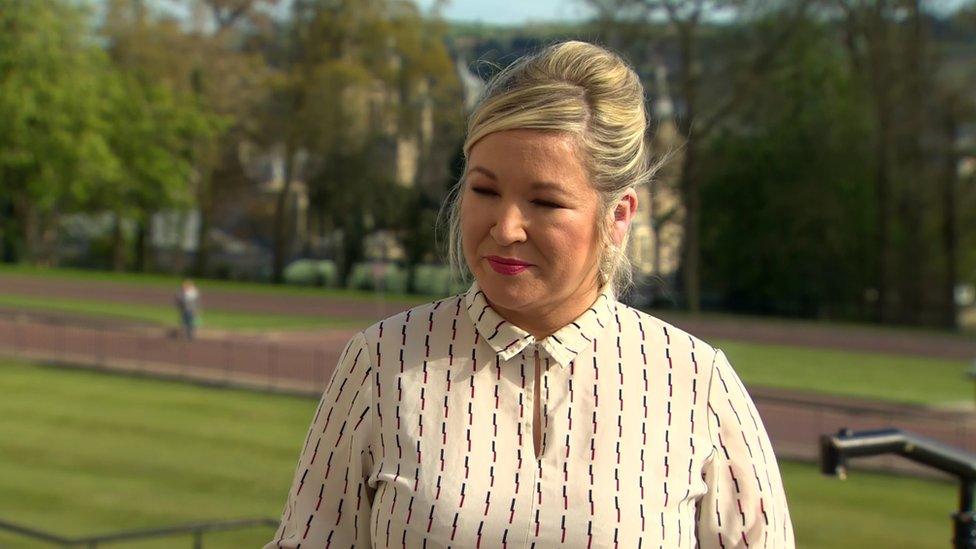
Deputy First Minister Michelle O'Neill said she had a decent if challenging relationship with Mrs Foster
Ms O'Neill said she and Mrs Foster had a decent if challenging relationship. She said they had worked well together through the Covid pandemic.
Irish Foreign Minister Simon Coveney tweeted his best wishes to Mrs Foster.
Allow X content?
This article contains content provided by X. We ask for your permission before anything is loaded, as they may be using cookies and other technologies. You may want to read X’s cookie policy, external and privacy policy, external before accepting. To view this content choose ‘accept and continue’.

SDLP leader Colum Eastwood also extended his best wishes to the outgoing first minister.
"We disagree on almost everything but she has clearly been a committed servant to her party for a long time," he said.
Ulster Unionist Party leader Steve Aiken said her departure demonstrated how difficult a life in politics could be.
He said there was now a place for a "progressive and modern approach to unionism".
Traditional Unionist Voice leader Jim Allister said it was a difficult day for Mrs Foster, adding he had found her "straightforward" in his dealings with her.
How did we get here?
Mrs Foster was elected as the first female leader of the DUP in December 2015, taking over from Peter Robinson. She was the only candidate.
Her time at the helm has been seen many challenges, having faced Brexit, a botched green energy scandal which subsequently led to the collapse of Stormont for three years and Covid-19.
The aftermath of Brexit has also caused friction both internally and between the party and some of its core voters who are unhappy at the deal which led to the Irish Sea border.
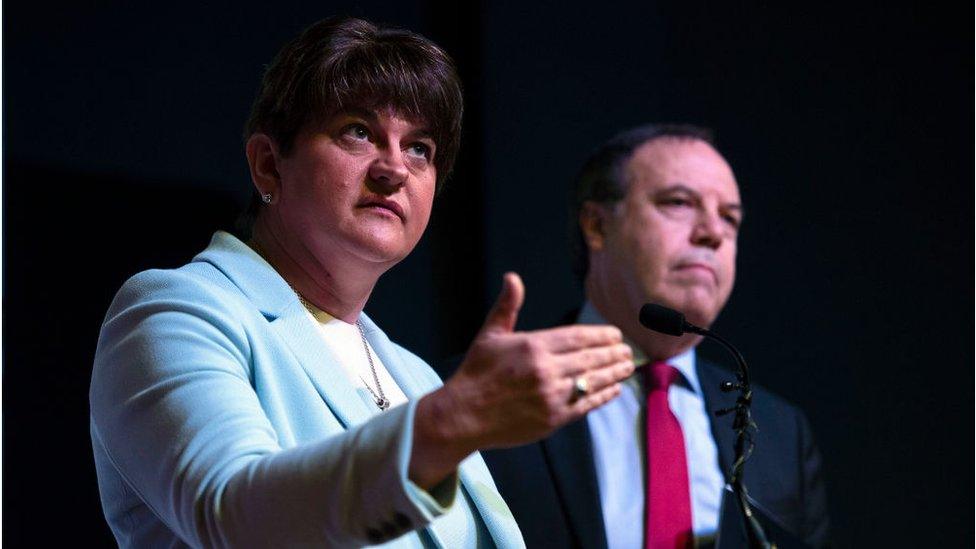
DUP councillors had called for the resignation of both Mrs Foster and party deputy leader Lord Dodds (pictured right)
The DUP has argued that it has never supported the Northern Ireland protocol and has actively tried to have it overthrown.
It was not just MLAs and MPs that voiced their discontent in Mrs Foster. Letters from a number of party councillors were also written, calling for Mrs Foster and deputy leader Lord Dodds to resign.
A number of issues of concern were listed, ranging from the NI Protocol, abortion legislation, same sex marriage, policing and the recent gay conversion debate at Stormont.
Who could replace Mrs Foster?
Possible contenders to replace Mrs Foster include NI Agriculture Minister Edwin Poots, Lagan Valley MP Sir Jeffrey Donaldson and East Belfast MP Gavin Robinson.
There has been speculation of a split role, with one person for first minister and then a party leader at Westminster.
Mr Poots tweeted that he wanted to thank Mrs Foster for her "service, sacrifice and commitment to the DUP and country".
Gavin Robinson thanked Mrs Foster for her "dedicated service to Northern Ireland" and said there would be "more to say about what lies ahead in the days to come".
How would a leadership election work?
DUP rules say a leadership election should be called by 30 April.
Normally this is simply a formality and the existing leader continues in their role, but other candidates are free to challenge them.
Only a small number of party members are eligible to vote in such a contest - MPs and NI Assembly members (MLAs). There are 27 MLAs that hold the party whip - including Mrs Foster - and eight MPs.
Party rules currently state the leader of the party must be an MLA, but there has been talk of changing this rule to allow an MP to hold the role.
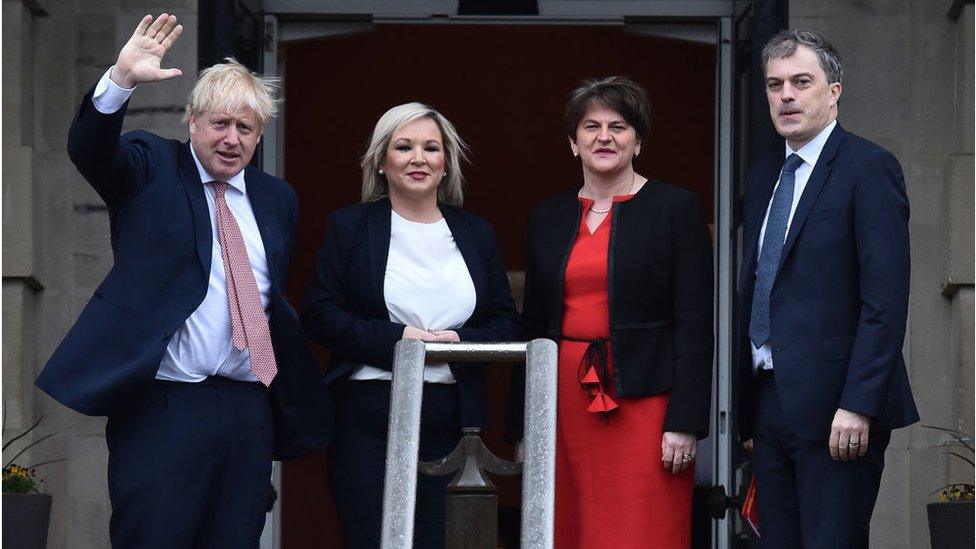
Boris Johnson and then NI Secretary Julian Smith visited Stormont in January 2020 to mark the restoration of devolution
The role of first minister is separate, but as the largest party from the largest grouping (unionism) in the assembly, the DUP is entitled to nominate someone to hold the post of first minister.
Once Mrs Foster steps down as first minister, the DUP would then be asked to nominate a replacement within seven days and a vote would be held in the assembly.
If a replacement is not nominated, then the Northern Ireland secretary is obliged to call an assembly election.
The New Decade, New Approach deal, external, which was signed in January 2020 and restored the NI Assembly after a three-year hiatus, included a commitment to extend the time to appoint a new first or deputy first minister after a resignation from seven days to six weeks.
However, this has not yet been legislated for.
A UK government spokesperson told the BBC that "good progress" was being made with the legislation and it would be brought forward during the second parliamentary session.
- Published14 June 2021
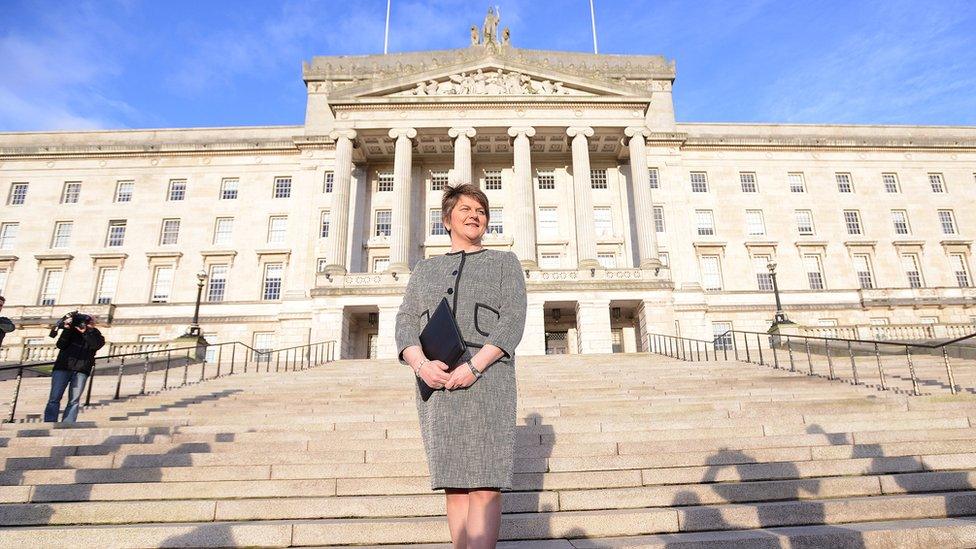
- Published28 April 2021
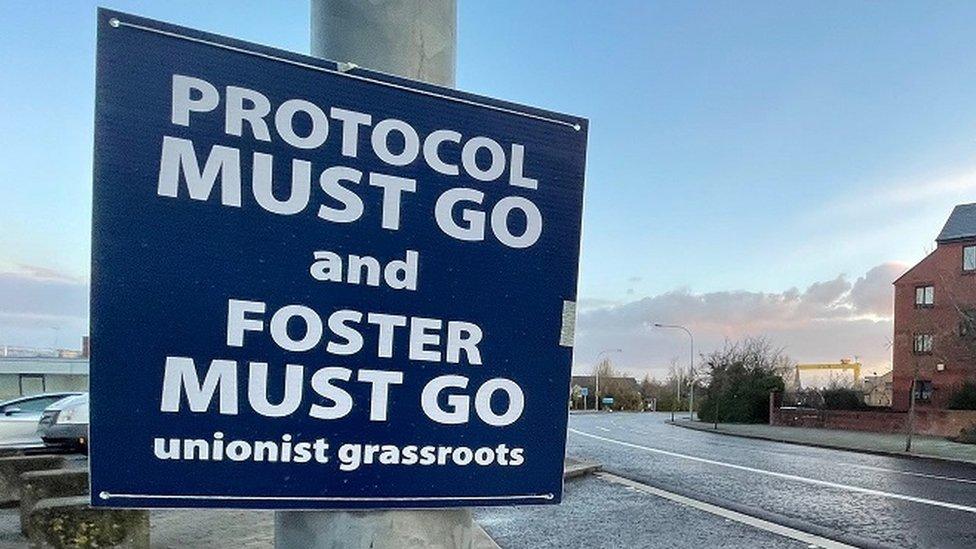
- Published28 April 2021
